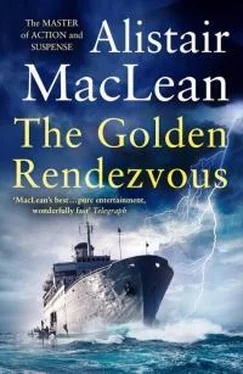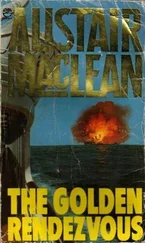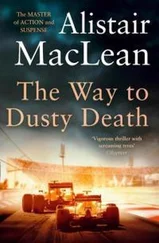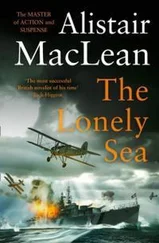Thursday 4 p.m. – 10 p.m.
It was late afternoon when I awoke, around four o’clock: still a good four hours short of sunset, but already the surgery lights were on and the sky outside dark, almost, as night. Driving slanting rain was sheeting down torrentially from the black louring clouds and even through closed doors and windows I could hear the high thin sound, part whine, part whistle, of a gale-force wind howling through the struts and standing rigging.
The Campari was taking a hammering. She was still going fast, far, far too fast for the weather conditions, and was smashing her way through heavy rolling seas bearing down on her starboard bow. That they weren’t mountainous waves, or waves of even an unusual size for a tropical storm, I was quite sure: it was the fact that the Campari was battering her way at high speed through quartering seas that seemed to be almost tearing her apart. She was cork-screwing viciously, a movement that applies the maximum possible strain on a ship’s hull. With metronomic regularity the Campari was crashing, starboard bow first, into a rising sea, lifting bows and rolling over to port as she climbed up the wave, hesitating, then pitching violently for’ard and rolling over to starboard as she slid down the far shoulder of the vanishing wave to thud with a teeth-rattling, jolting violence into the shoulder of the next sea, a shaking, shuddering collision that made the Campari vibrate for seconds on end in every plate and rivet throughout her entire length. No doubt but that the Clyde yard that had built her had built her well: but they wouldn’t have constructed her on the assumption that she was going to fall into the hands of maniacs. Even steel can come apart.
“Dr. Marston,” I said. “Try to get Carreras on that phone.”
“Hallo, awake?” He shook his head. “I’ve been on to him myself, an hour ago. He’s on the bridge and he say’s he’s going to stay there all night if need be. And he won’t reduce speed any further: he’s taken her down to fifteen knots already, he says.”
“The man’s mad. Thank God for the stabilisers. If it weren’t for them, we’d be turning somersaults.”
“Can they stand up to this sort of thing indefinitely?”
“I should think it highly unlikely. The captain and bo’sun – how are they?”
“The captain’s still asleep, still delirious, but breathing easier. Our friend Mr. MacDonald you can ask for yourself.”
I twisted in my bed. The bo’sun was indeed awake, grinning at me. Marston said; “Seeing you’re both awake, do you mind if I have a kip down in the dispensary for an hour? I could do with it.”
He looked as if he could, too, pale and exhausted.
“We’ll call you if anything goes wrong.” I watched him go, then said to MacDonald: “You like your sleep, don’t you?”
“Just naturally idle, Mr. Carter.” He smiled. “I was wanting to get up, but the doctor wasn’t keen.”
“Surprised? You know your knee-cap is smashed and it’ll be weeks before you can walk properly again.” He’d never walk properly again.
“Aye, it’s inconvenient. Dr. Marston has been talking to me about this fellow Carreras and his plans. The man’s daft.”
“He’s all that. But daft or not, what’s to stop him?”
“The weather, perhaps. It’s pretty nasty outside.”
“The weather won’t stop him. He’s got one of those fantastic one-track minds. But I might have a small try at it myself.”
“You?” MacDonald had raised his voice, now lowered it to a murmur. “You! With a smashed thigh-bone. How in the–”
“It’s not broken.” I told him of the deception. “I think I can get around on it if I don’t have too much climbing to do.”
“I see. And the plan, sir?”
I told him. He thought me as daft as Carreras. He did his best to dissuade me, finally accepted the inevitable and had his own suggestions to make. We were still discussing it in low voices when the sick-bay door opened and a guard showed Susan Beresford in, closed the door and left.
“Where have you been all day?” I said accusingly.
“I saw the guns.” She was pale and tired and seemed to have forgotten that she had been angry with me for co-operating with Carreras. “He’s got a big one mounted on the poop and a smaller one on the fo’c’sle. Covered with tarpaulins now. The rest of the day I spent with Mummy and Daddy and the others.”
“And how are our passengers?” I inquired. “Hopping mad at being shanghaied or do they regard it as yet another of the attractions of the Campari – a splendid adventure thrown in at no extra charge that they can talk about to the end of their days. I’m sure most of them must be pretty relieved that Carreras is not holding them all to ransom.”
“Most of them are not caring one way or another,” she said. “They’re so sea-sick they couldn’t care if they lived or died. I feel a bit the same way myself, I can tell you.”
“You’ll get used to it,” I said callously. “You’ll all get used to it. I want you to do something for me.”
“Yes, John?” The dutiful murmur in the voice which was really tiredness, the use of the first name, had me glancing sharply across at the bo’sun, but he was busy examining a part of the deckhead that was completely devoid of anything to examine.
“Get permission to go to your cabin. Say you’re going for blankets, that you felt too cold here last night. Your father’s dinner suit – slip it between the blankets. Not the tropical one, the dark one. For heaven’s sake see you’re not observed. Have you any dark-coloured dresses?”
“Dark-coloured dresses?” She frowned. “Why–”
“For Pete’s sake!” I said in low-voiced exasperation. I could hear the murmur of voices outside. “Answer me!”
“A black cocktail dress–”
“Bring it also.”
She looked at me steadily. “Would you mind telling me–”
The door opened and Tony Carreras came in, balancing easily on the swaying, dipping deck. He carried a rain-spattered chart under his arm.
“Evening, all.” He spoke cheerfully enough, but for all that he looked rather pale. “Carter, a small job from my father. Course positions of the Fort Ticonderoga at 8 a.m., noon and 4 p.m. today. Plot them and see if the Ticonderoga is still on its predicted course.”
“ Fort Ticonderoga being the name of the ship we have to intercept?”
“What else?”
“But – but the positions,” I said stupidly. “The course positions of – how the devil do you know? Don’t tell me the Ticonderoga is actually sending you her positions? Are the – are the radio operators on that ship–”
“My father thinks of everything,” Tony Carreras said calmly. “Literally everything. I told you he was a brilliant man. You know we’re going to ask the Ticonderoga to stand and deliver. Do you think we want it sending out S.O.S’s when we fire a warning shot across its bows? The Ticonderoga ’s own radio officers had a slight accident before the ship left England and had to be replaced by – ah – more suitable men.”
“A slight accident?” Susan said slowly. What with seasickness and emotion her face was the colour of paper, but she wasn’t scared of Carreras any that I could see. “What kind of accident?”
“A kind that can so easily happen to any of us, Miss Beresford.” Tony Carreras was still smiling, but somehow he no longer looked charming and boyish: I couldn’t really see any expression on the face at all, all I could see were the curiously flattened eyes. More than ever I was sure that there was something wrong with young Carreras’s eyes: and more than ever I was sure that the wrongness lay not in the eyes alone but was symptomatic and indicative of a wrongness that lay much deeper than the eyes. “Nothing serious, I assure you.” Meaning that they hadn’t been killed more than once. “One of the replacements is not only a radio man but an expert navigator. We saw no reason why we should not take advantage of this fact to keep us informed as to the exact position of the Ticonderoga . Every hour on the hour.”
Читать дальше
Конец ознакомительного отрывка
Купить книгу












